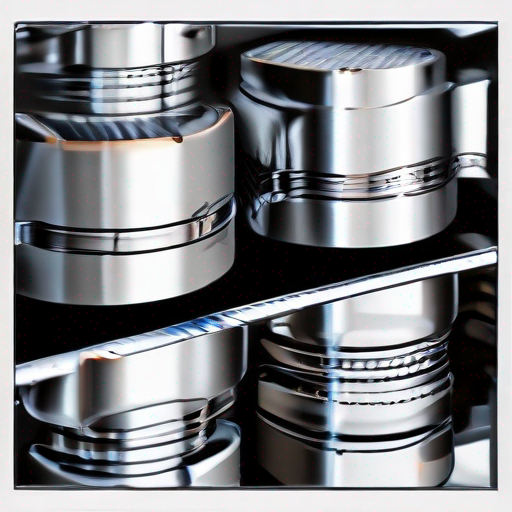
Metals That Never Rust: Incredibly Durable and Long-Lasting Options
When it comes to selecting materials for construction, manufacturing, or even jewelry-making, durability is a crucial factor. Some metals are more prone to rust and corrosion than others, which can lead to costly repairs, replacements, or even safety hazards. However, there are certain metals that never rust, offering unparalleled durability and longevity.
In this article, we'll delve into the world of rust-resistant metals, exploring their properties, benefits, and uses. We'll also examine some common myths surrounding these metals and provide a comprehensive comparison table to help you make informed decisions.
What Makes Metals Rust?
Before diving into the world of rust-free metals, it's essential to understand what causes rust in the first place. Rust, or corrosion, occurs when certain metals react with oxygen, water, and other environmental factors. This reaction forms iron oxide, a flaky, reddish substance that can weaken structures and lead to costly repairs.
The Magic of Metals That Never Rust
Some metals possess inherent properties that make them naturally resistant to rust and corrosion. These metals typically have a thin layer of oxide on their surface, which acts as a barrier against the elements. This natural oxide layer is incredibly effective at preventing corrosion, making these metals perfect for applications where durability is paramount.
1. Titanium (Ti)
Titanium is one of the most corrosion-resistant metals in the world, thanks to its naturally occurring oxide layer. With a density similar to steel, titanium offers exceptional strength-to-weight ratios and excellent fatigue resistance. Its unique properties make it an ideal choice for aerospace, marine, and medical applications.
2. Stainless Steel (SS)
Stainless steel is another rust-resistant metal that's widely used in various industries. Comprising iron, chromium, and nickel, stainless steel forms a protective oxide layer when exposed to air, preventing corrosion from occurring. Its high-temperature resistance, corrosion immunity, and ease of cleaning make it a popular choice for kitchen utensils, surgical instruments, and architectural fixtures.
3. Monel (Cu-Ni)
Monel is a copper-nickel alloy that boasts remarkable corrosion resistance due to its natural oxide layer. Its unique properties make it an excellent choice for marine environments, chemical processing, and high-temperature applications.
4. Inconel (Ni-Cr)
Inconel is a nickel-chromium alloy that's renowned for its exceptional corrosion resistance. Its naturally occurring oxide layer prevents rust from forming, making it perfect for extreme temperatures, high-pressure applications, and harsh environments.
5. Zirconium (Zr)
Zirconium is a transition metal that forms an incredibly thin, stable oxide layer, rendering it highly resistant to corrosion. Its unique properties make it suitable for nuclear reactors, marine applications, and high-temperature processes.
Common Myths Debunked
Before we conclude our exploration of metals that never rust, let's address some common misconceptions:
- Myth: Titanium is too expensive.
- Reality: While titanium can be more costly than other metals, its exceptional durability and strength make it a worthwhile investment for certain applications.
- Myth: Stainless steel is only suitable for kitchen utensils.
- Reality: Stainless steel has numerous industrial, architectural, and medical applications due to its corrosion resistance and high-temperature properties.
Comparison Table: Metals That Never Rust
| Metal | Density (g/cm³) | Strength-to-Weight Ratio | Corrosion Resistance | Temperature Resistance |
|---|---|---|---|---|
| Titanium (Ti) | 4.5 | High | Excellent | High |
| Stainless Steel (SS) | 7.9-8.1 | Medium-High | Good | High-Moderate |
| Monel (Cu-Ni) | 8.3-8.6 | Medium | Very Good | Moderate-High |
| Inconel (Ni-Cr) | 8.2-8.4 | Low-Medium | Excellent | High |
| Zirconium (Zr) | 5.9-6.1 | Low | Exceptional | High |
Key Takeaways
Metals that never rust offer unparalleled durability and longevity, making them ideal for applications where reliability is paramount. Titanium, stainless steel, Monel, Inconel, and zirconium are just a few examples of these incredible materials.
When selecting metals for your project or application, consider the following:
- Environment: Will your metal be exposed to harsh conditions, such as high temperatures, corrosive substances, or moisture?
- Strength-to-weight ratio: Do you need a lightweight material with exceptional strength?
- Corrosion resistance: Is your metal likely to come into contact with oxygen, water, or other substances that could cause corrosion?
By choosing the right rust-resistant metal for your project, you'll ensure its longevity and performance. For more information on metals that never rust, visit https://ratherpretty.com/metal-that-never-rust.
References
- ASM International: "Metals Handbook"
- MatWeb: "Properties of Titanium (Ti)"
- Stainless Steel Information Center: "Properties of Stainless Steel"
Note: The information provided in this article is for general purposes only and should not be considered as professional or technical advice. It's recommended to consult with industry experts or conduct thorough research before making any decisions regarding the selection of metals for a specific application.
